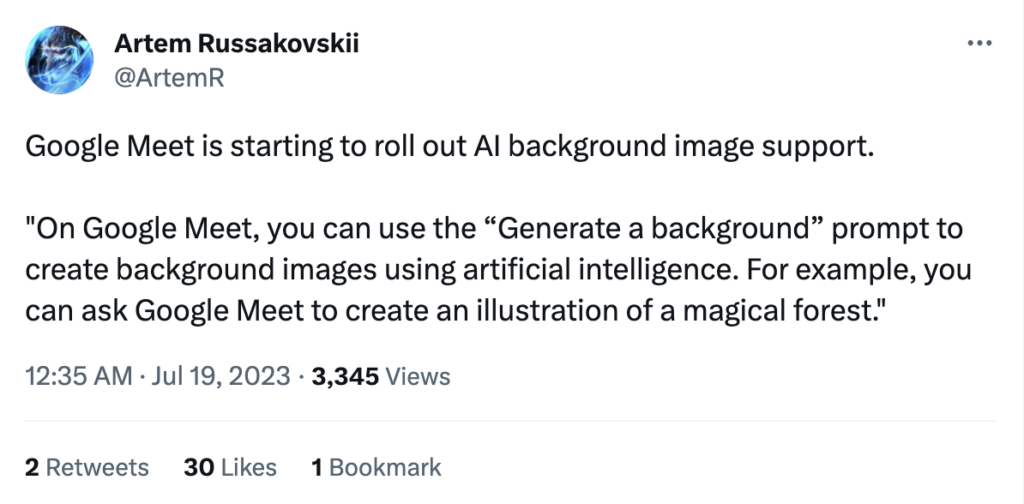
7-27 #Appreciation : A new Galaxy FE smartphone will launch soon; India has asked Xiaomi, OPPO, vivo to pay unpaid tax dues; India has rejected BYD’s proposal to set up a USD1B factory in India; etc.

Barclays analysts Blayne Curtis and Tom O’Malley believe that Apple is no longer planning to launch a fourth-generation iPhone SE in 2024. The analysts said the device was expected to feature an Apple-designed 5G modem, but the plans appear to be delayed. Qualcomm could remain Apple’s modem supplier for both the iPhone SE and the iPhone 16 lineup through 2024, as it appears Apple’s modem is not ready yet. (Gizmo China, MacRumors, Apple Insider)
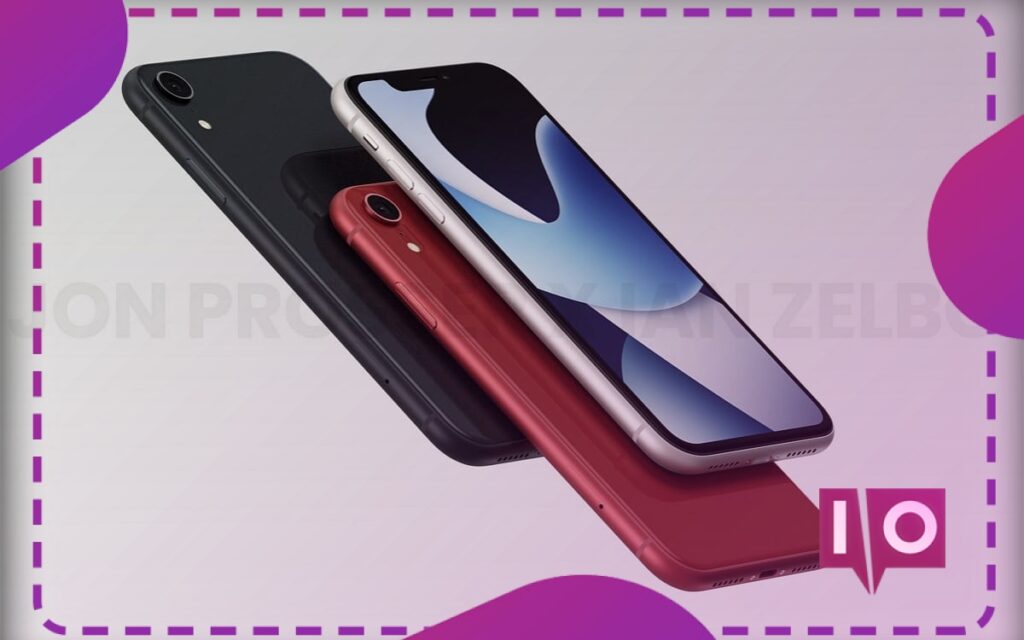
NXP Semiconductors CEO Kurt Sievers believes that China’s slumping smartphone market remains far from a rebound but that one major non-Android customer’s chip orders are still comparing well with historical trends. Netherlands-based NXP makes a near-field communications chip that goes into smartphones to help with mobile payments and other functions. NXP’s positive forecast suggests that Apple’s strength in the market could continue. Sievers has mentioned that NXP expects a 23% increase in mobile revenue for the current 3Q23, surpassing USD284M earned in the previous quarter. (CN Beta, Reuters, TS2, Phone Arena, Market Screener)

The Council of the European Union approved a regulation to strengthen Europe’s presence in the world of semiconductors, better known as “Chips Act”. The legislation aims to create better conditions for European countries to get into semiconductor manufacturing, attract investments, promote research and innovation and prepare the continent for any future supply chain crisis. Once the program kicks in, it will see EUR43B total investments, EUR3.3B of which will be donated directly from the EU budget, and the aim is the global market share to double from the current 10% to at least 20% by 2030. The global production of microchips reached 1.1T units in 2021, which is around 140 chips per person. Europe produced 10% of that in 2020, of which 27% were for the automotive industry, 22% for aerospace / defence /security and 20% for other industries. Smartphones were not even in the Top 5. The market is expected to reach USD1T by 2030, and the forecast is for all key application sectors rapidly increase. For example, the global smartphone chip market was USD116B in 2020 and is expected to reach USD210B in 2030. (GSM Arena, Europa)
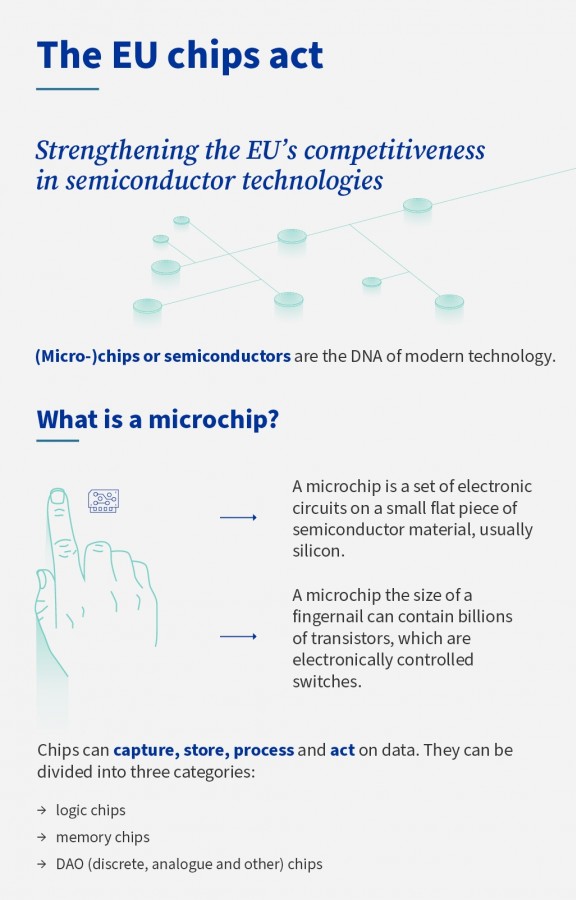
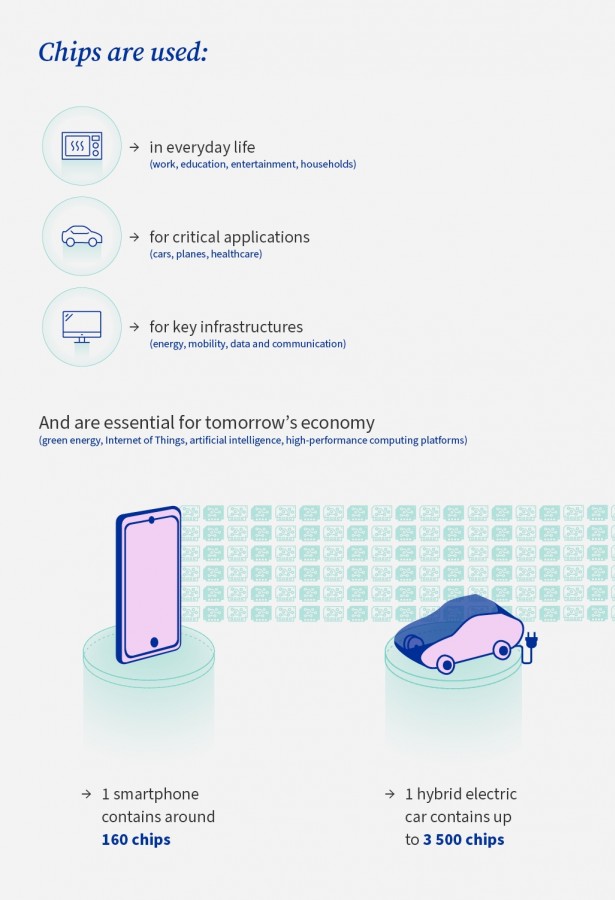
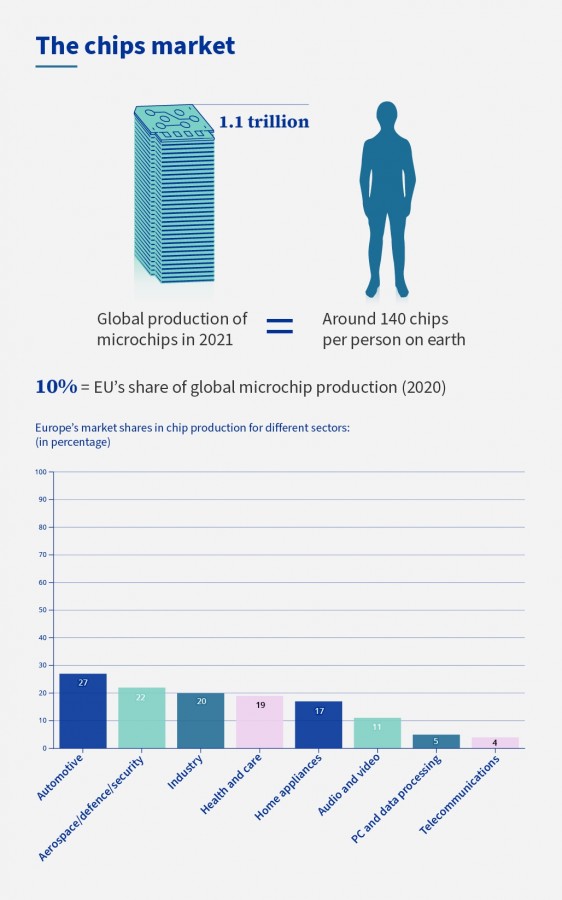

OnePlus is rumored to launch its foldable OnePlus Open soon, which will be rebranded as OPPO Find N3 in China. The new foldable features 2K foldable display, camera system that has a 48MP primary sensor, a 48MP ultrawide sensor, and a 64MP telephoto camera sensor. (Android Authority, Twitter, GizChina, GSM Arena)
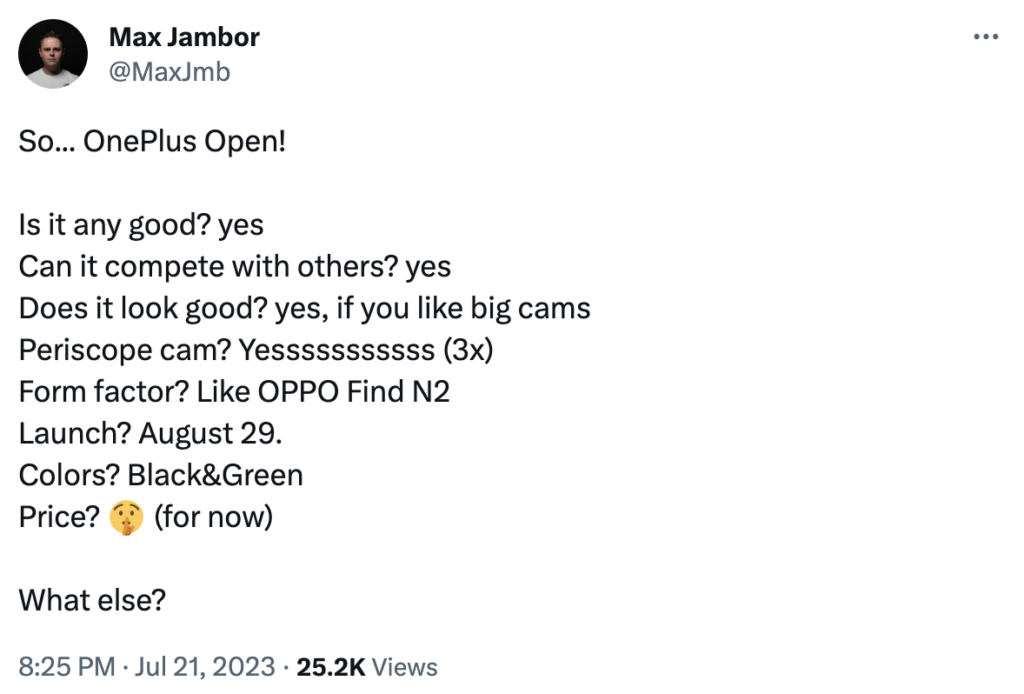
Sony’s alleged Xperia Flip display is rumored to be 7” with 4K display with a 21:9 aspect ratio. Given Sony’s reputation for innovation, the Xperia Flip is expected to be a significant contender in the smartphone market. However, further details are needed to fully grasp the potential of this exciting upcoming product. (Gizmo China, Twitter)
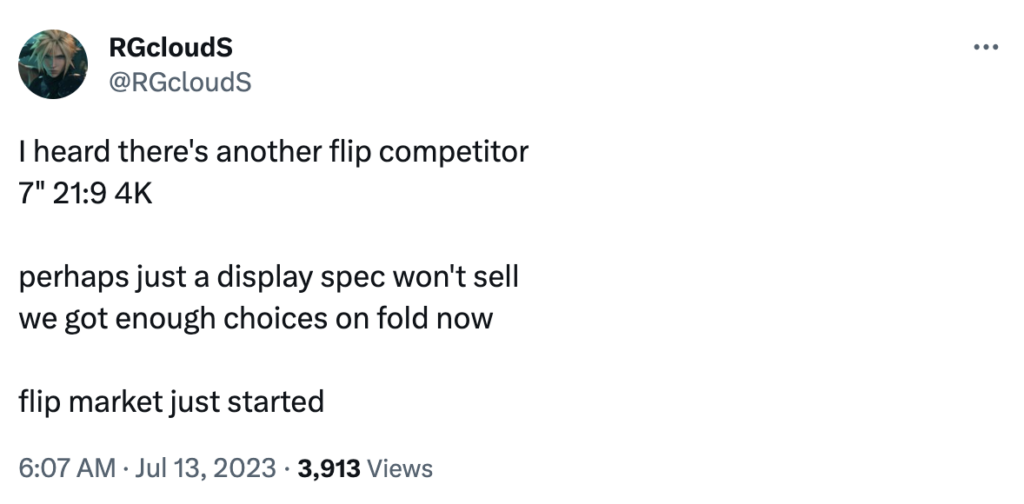
Samsung Display Managing Director Baek Seung-in has discussed how the durability of foldable displays has been improving even though they are not nearly as durable as non-foldable display. Samsung Display is working to make “foldable wrinkles less conspicuous”. He says that the industry has been working to eradicate the problem with creases for several years but they have not yet disappeared. He has also said that there is interest in the industry in making devices that carry a 25” screen when unfolded and measure 13” when folded. Apple is working on a foldable device with Samsung Display and LG Display and that Apple is waiting to receive certain patents related to this product. Apple is reportedly working on a foldable MacBook Pro with a huge 20.5” foldable display. That device could arrive as soon as 2025 followed by a foldable iPhone.(Phone Arena, The Elec, Apple Insider)
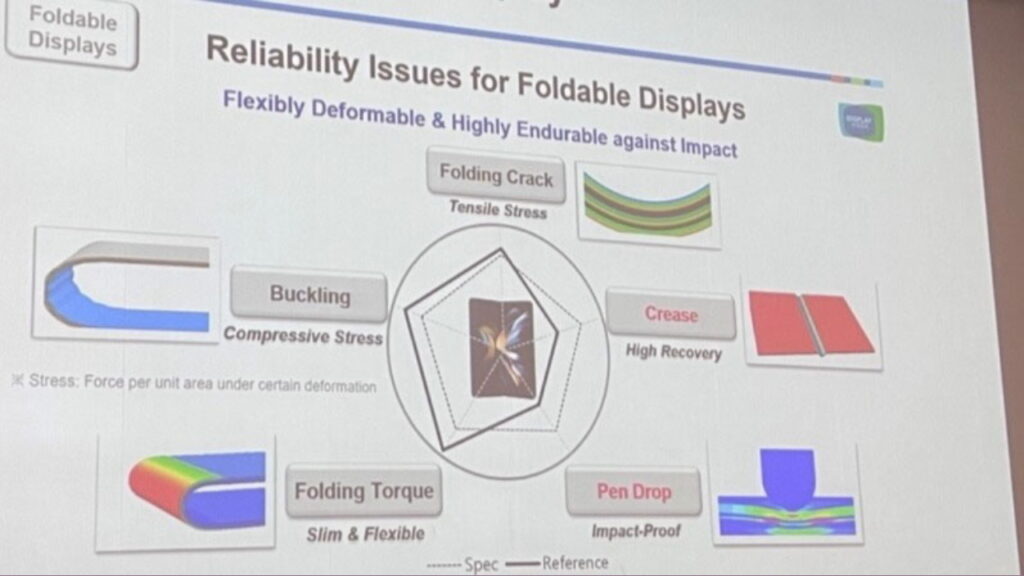
Apple has asked its display panel suppliers Samsung Display and LG Display to develop zero-bezel OLED panels. The bezel area of the screen houses components such as the antenna and the protective encapsulation on the screen also makes it very difficult to make screens with absolutely no bezel. The project will take years as Samsung Display and LG Display will need to bend the circuits under the bezel area. They will also need to secure enough area for the antenna that can function without interruption. The encapsulation will need to become even thinner while the under panel camera area must also blend perfectly with the rest of the screen for the perfect visual effect. Apple wants the inorganic and organic layers of the encapsulation to become thinner.(The Elec, Patently Apple, SamMobile)

Tianma has showcased large-size cockpit display, local dimming technology, key core technology of special-shaped cutting, and forward-looking display technology such as Micro-LED. Tianma’s integrated DMS under-display camera display technology is particularly eye-catching. It is reported that it can hide the camera at any position under the display, which can effectively avoid the complex structure of the electronic system in the cockpit caused by installing the camera separately in front of the center console or instrument panel. The degree of increase, or the increase in the cost of model modification caused by integration on the steering wheel. At the same time, the SoC built-in chip equipped with Tianma’s original algorithm can not only recognize the driver’s face and track the eye movement trajectory, but also recognize the driver’s behavior through deep learning, such as “close eyes”, “yawn”, “head Abnormal location”, “calling”, “smoking”, “not in the monitoring area” and other six behaviors that affect driving safety, and display corresponding warning information on the screen to ensure driving safety.(CN Beta, IT Home, My Drivers, Tianma)
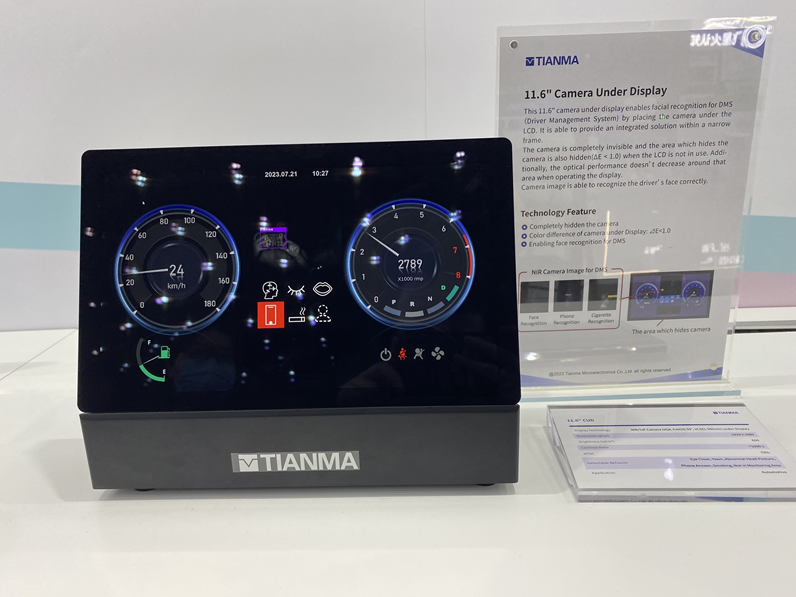

Apple’s iPhone 15 lineup will reportedly feature a glass-plastic hybrid lens with an ƒ/1.7 aperture before Apple expands the technology with iPhone 16 models in 2024. The hybrid lens will reportedly feature a single glass element and six plastic elements. The iPhone 15 and iPhone 15 Plus models are expected to be equipped with the 48Mp rear camera introduced on the iPhone 14 Pro and iPhone 14 Pro Max in 2022. (CN Beta, Apple Insider, MacRumors, Twitter)
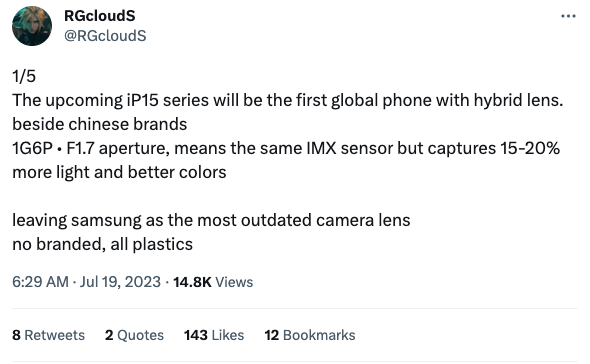
According to TF Securities anlayst Ming-chi Kuo, the wide camera CIS of Apple’s two iPhone 15 standard models will be upgraded to 48MP and adopt a new stacked CIS design. Due to the low yield rate, Sony has increased the CIS production capacity for Apple by 100–120% to meet Apple’s demand, resulting in a significant reduction in high-end CIS supply for Android. The global CIS wafer reconstruction (RW) key supplier Tong Hsing’s earnings call pointed out that the bottom of the CIS industry is 3Q23. China’s semiconductor industry policy continues to implement the domestic replacement strategy, which is the main reason why Tong Hsing is conservative in its future mobile phone CIS RW business (orders continue to be lost to Chinese competitors). The current inventory in the CIS supply chain has improved to a normal level (10–14 weeks) from 30–40 weeks in 1H23. (Medium, MacRumors, Twitter)
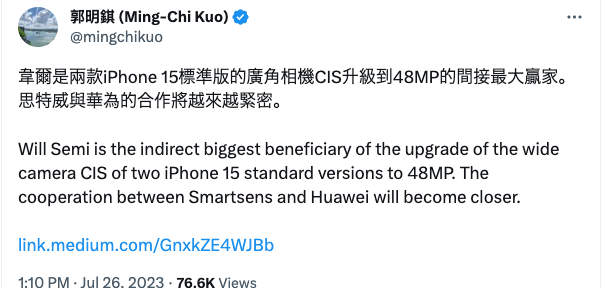

Google has officially announced its support for the Messaging Layer Security (MLS) protocol for its Messages app. It is hoping to increase the cross-platform link and convince Apple to make changes in iMessage. The Internet Engineering Task Force (IETF) recently released the MLS protocol. Under the premise of supporting end-to-end encryption, it can not only achieve cross-platform and cross-service interoperability but also have enough flexibility to help providers solve user privacy and security threats. MLS is an IETF standard that enables strong end-to-end encryption for group chats. It ensures that messages are only accessible to the chat’s end points. It does not go through any server that helps to deliver the message. (GizChina, Google)
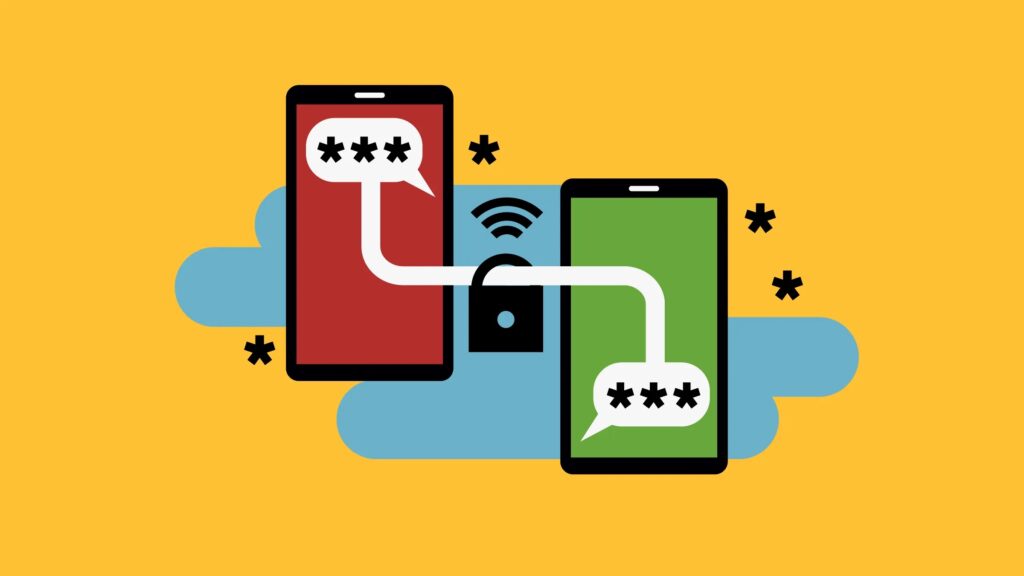
Justin Hume, vice-president of mobile for Samsung South Africa, has revealed that a Galaxy FE smartphone will launch soon. Samsung has not released a Galaxy FE smartphone since the Galaxy S21 FE back in Jan 2022. (Android Authority, Android Central)
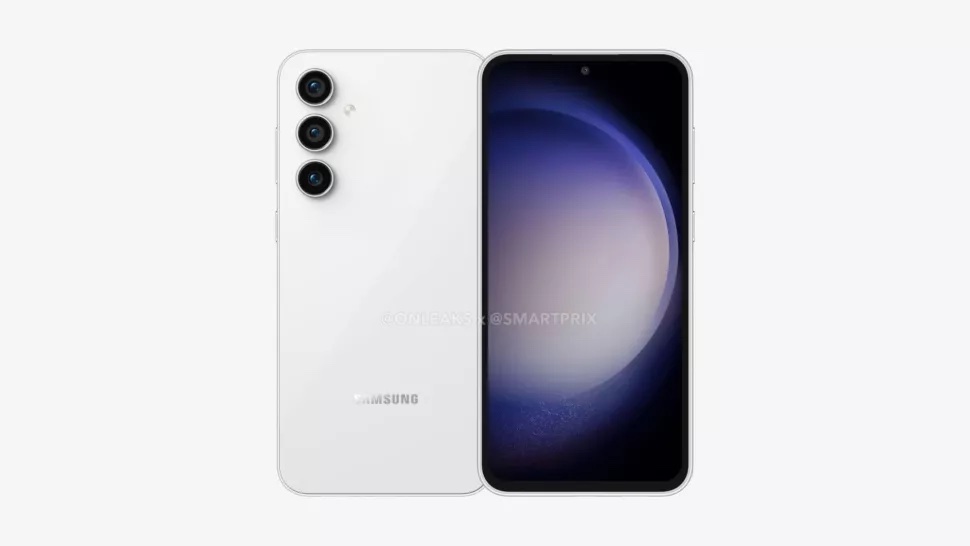
Google is revamping the Play Store for large-display devices like foldable phones, Android tablets, and Chromebooks. It is now introducing four major updates to help users find good large-screen apps and improve the overall experience of the Play Store on big devices. Google will now prioritize games with high-quality videos. Users will see video banners at the top of a gaming app’s listing page, allowing them to get a sense of gameplay before downloading the app. Google has also organized apps and games details pages in a multi-column layout, bringing content higher up the app listing page. Google is also improving Play Store navigation for big-display devices. (Android Authority, Google)
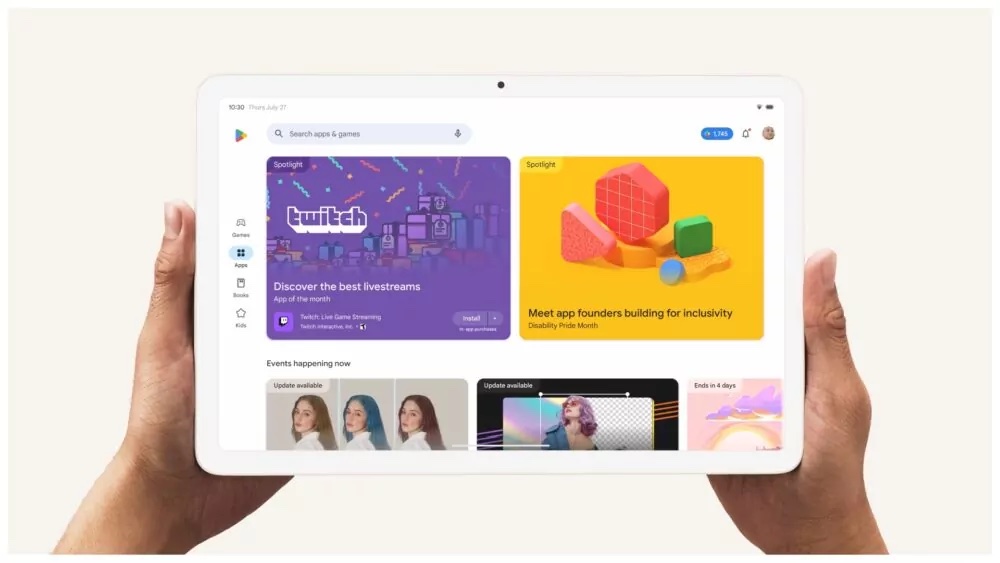
Apple has found itself the target of a GBP785M (USD1B) class action lawsuit brought by more than 1,500 apps developers in the UK over its App Store fees. Apple’s services business, which includes the App Store, has seen revenues grow at a rapid pace in the last few years and now hovers around USD20B per quarter. However, the commissions of 15%-30% that the company charges some app makers for use of an in-app payment system has been criticised by apps developers and targeted by antitrust regulators in several countries. Apple has previously said that 85% of developers on the App Store do not pay any commission and that it helps European developers to access markets and customers in 175 countries around the world through the App Store. (Apple Insider, Reuters)
India has asked top Chinese smartphone brands such as Xiaomi, OPPO, vivo and PC maker Lenovo to pay unpaid tax dues and is pursuing recoveries with owners of the brands concerned, having initiated probes into alleged instances of GST and import levy evasion over multiple years. The Finance Ministry informed the parliament that major Chinese smartphone makers including Xiaomi, vivo, OPPO have evaded custom duties and made illegal remittances in India to the tune of at least INR8,000 crore. The ministry said that the Xiaomi evaded a total taxes of INR653 crore in 2019-2020, INR23.99 crore in 2020-2021 and INR4.61 crore in 2022-2023. OPPO evaded custom duties worth INR4,403 crore in 2017-2021. Additionally, the ministry has identified 13 instances in total where the companies were indulging in GST evasions from Jul 2017 to Jun 2023. As per the data, the authorities managed to recover nearly INR1025 crore out of about INR1108 crore GST that was evaded. (CN Beta, CNBCTV18, India Times, TechNode)
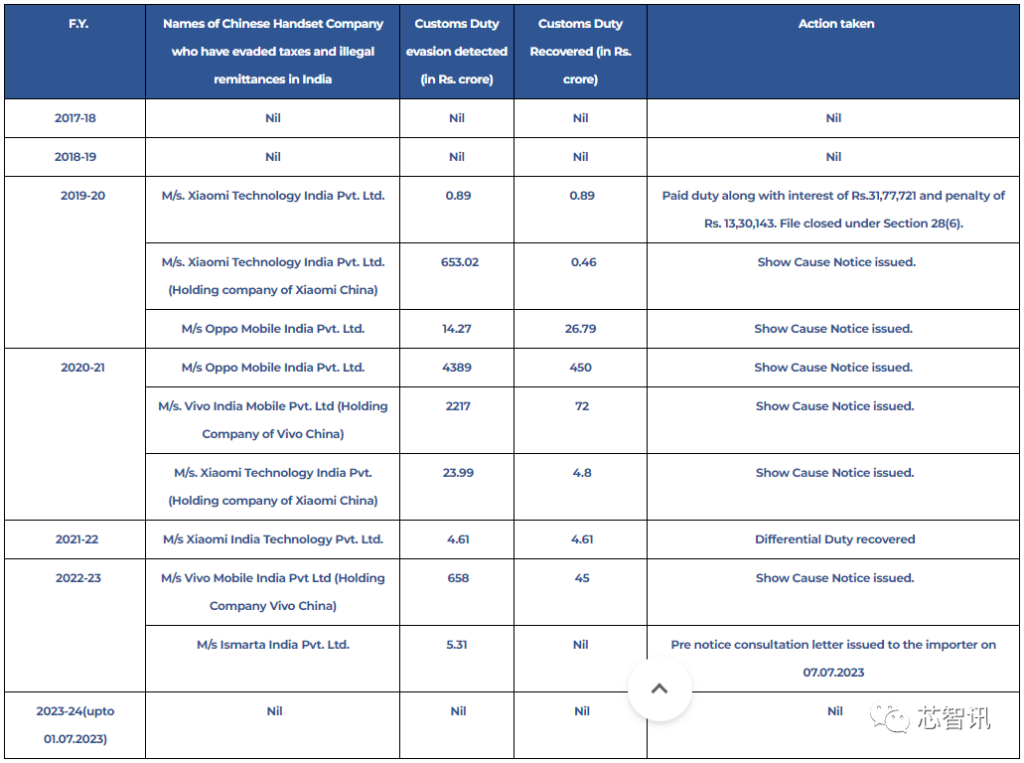
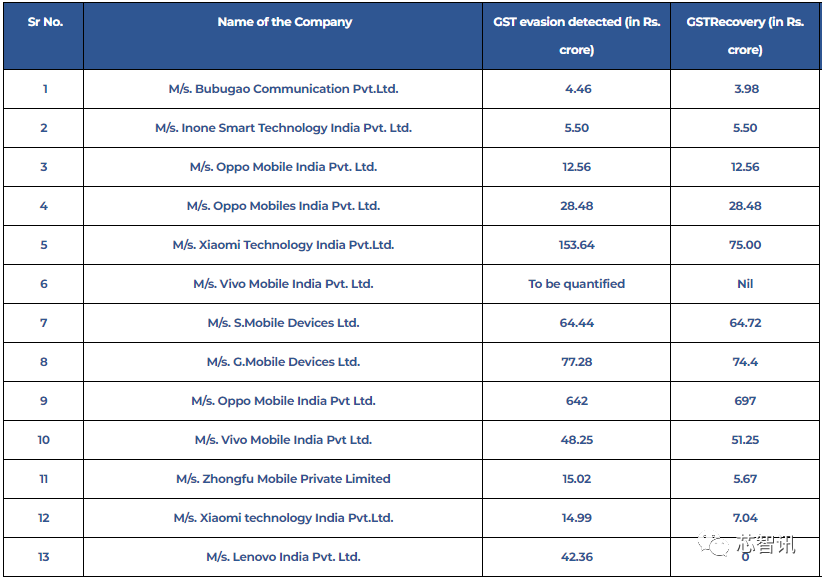
Xiaomi has announced that it will not be diluting the company’s shareholding in India by inducting an Indian partner through the joint venture route, which their peers such as MG Motors and BYD have been following. The company’s president in India, Muralikrishnan B, has indicated that the company will remain a 100% subsidiary of their Chinese parent. He also believes a streamlined phone portfolio, affordable 5G devices and localised manufacturing, will show results in 2024 and beyond. The company is embarking on a simplification of its smartphone line-up, that covers different price points under the Redmi and Xiaomi umbrellas. Xiaomi is betting big on the INR10,000-15,000 device segment to regain its lost market share. He has also firmly stated that the company will not be laying off employees in India in 2023. He has clarified that organizational restructuring is occasionally necessary to align with the company’s strategic goals, ensuring efficiency and clarity of roles.(CN Beta, Hindustan Times, India Today, Economic Times, Money Control)

TikTok reportedly plans to adopt the concept of a super app, is expanding its empire into e-commerce with “TikTok Shop Shopping Center”. The short-video app is seeking to replicate the American success of Chinese shopping platforms Shein and Temu and will be responsible for the storage and shipping of items on behalf of manufacturers and merchants in China. The new platform is expected to launch in Aug 2023 and will offer a wide variety of products, including clothes, electronics, and home goods. TikTok will handle the marketing and logistics for the platform, while the Chinese merchants will be responsible for manufacturing and shipping the products. The “TikTok Shop Shopping Center” will initially be exclusive to China. (GizChina, Gizmo China, WSJ, E&P, CNA)

Microsoft has additionally diminished the worker headcount by 1,000. The bulk of the job cuts affected the customer service and sales positions, causing ripples and raising concerns throughout the industry. The move led to the dissolution of the “Digital Sales and Success” group, a sales and customer service team that once boasted of thousands of personnel. (CN Beta, Analytics Insights, Business Insider, OnMSFT)
A federal jury in Waco, Texas, has decided that Alphabet’s Google violated a software developer’s patent rights with its remote-streaming technology and must pay USD338.7M in damages. The jury found that Google’s Chromecast and other devices infringe patents owned by Touchstream Technologies related to streaming videos from one screen to another. Google spokesperson Jose Castaneda has said that the company will appeal the verdict and has “always developed technology independently and competed on the merits of our ideas”. (Android Central, Reuters)

India has rejected Chinese automaker BYD’s proposal to set up a USD1B factory in India in partnership with Hyderabad-based Megha Engineering and Infrastructure. BYD submitted a USD1B investment proposal to build electric cars and batteries in India in partnership with a local company in early Jul 2023. The two companies had in their application to the Department for Promotion of Industry and Internal Trade (DPIIT) proposed to set up an electric vehicle plant in Hyderabad. The DPIIT had sought opinions from other departments on the investment proposal. In its proposal to the DPIIT, the venture made a pitch to manufacture 10,000-15,000 electric cars a year. Megha was putting up the capital while technology and know-how was to come from BYD. (CN Beta, Reuters, India Times, Economic Times)
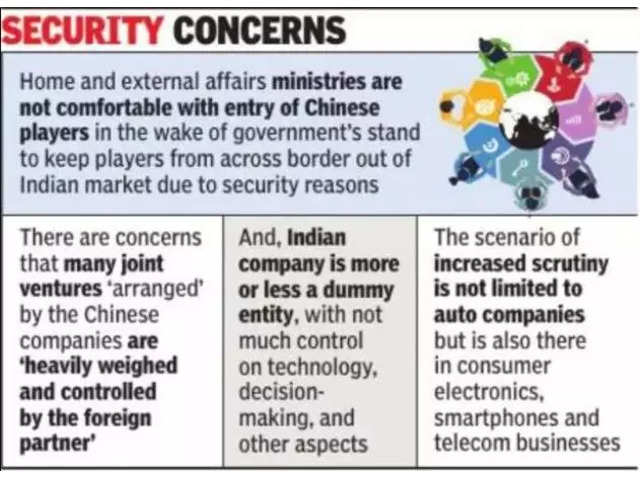

PayPal and Microsoft have announced Microsoft’s integration of PayPal’s Pay Later solution in the U.S., U.K., Australia, Germany, France, Spain, and Italy. In addition, customers in the U.S. will soon have the option to pay with Venmo in the Microsoft Store. Venmo is currently available in the Microsoft Store on Xbox in the U.S. These new integrations offer customers more flexible ways to pay and help increase customer loyalty.(TechCrunch, PayPal)
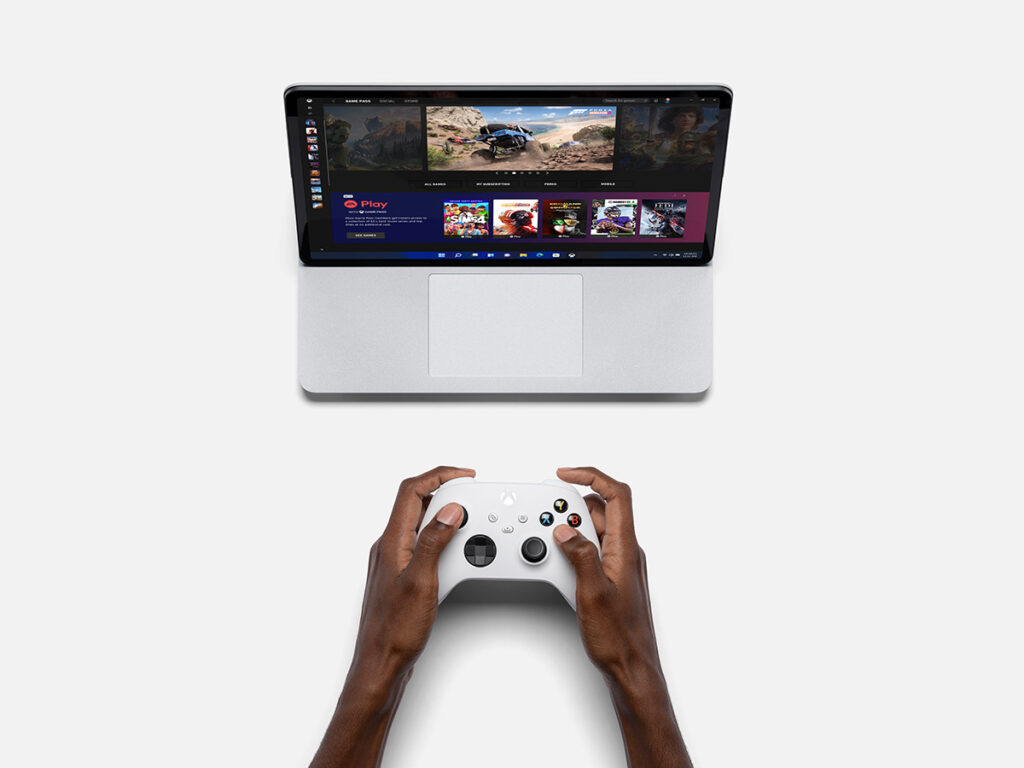
Samsung Electronics America has launched student IDs on Samsung Wallet at 68 colleges, universities, and higher education institutions across the nation including Penn State, the University of Florida, Central Michigan University, University of North Alabama, and the Stevens Institute of Technology. The update will add a convenient way to use student IDs on a Galaxy smartphone. Samsung is working closely with partners to expand the offering to even more institutions. (Engadget, Samsung)
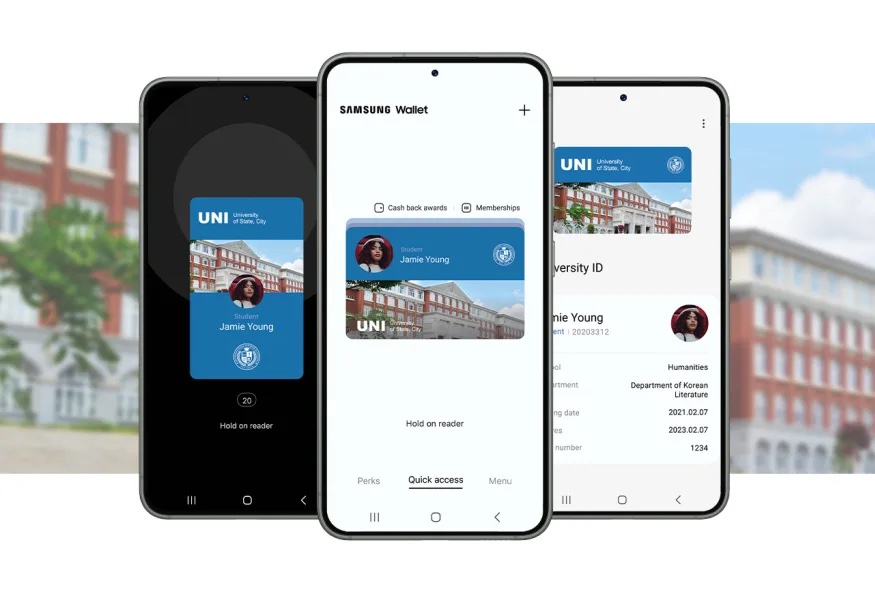

Google is experimenting with a generative AI feature to create new backgrounds for Google Meet calls. The feature is part of Google Workspace Labs. Users are going to be presented with the option to Enter a prompt, and users will be able to create any kind of background they desire. Google suggests adding a style or mood reference in order to get better results. Furthermore, users will be able to see different background examples created from the prompt, giving users more choices. Users will also have the flexibility of creating more samples if the ones generated are not satisfactory.(TechCrunch, Twitter, XDA-Developers, Google)
